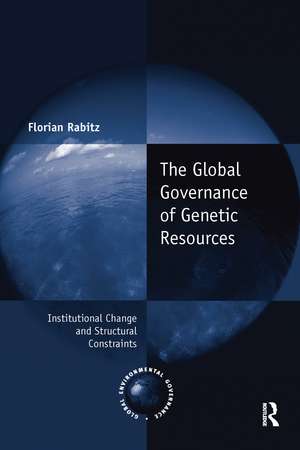The Global Governance of Genetic Resources: Institutional Change and Structural Constraints: Global Environmental Governance
Autor Florian Rabitzen Limba Engleză Paperback – 30 sep 2021
| Toate formatele și edițiile | Preț | Express |
|---|---|---|
| Paperback (1) | 382.57 lei 6-8 săpt. | |
| Taylor & Francis – 30 sep 2021 | 382.57 lei 6-8 săpt. | |
| Hardback (1) | 763.39 lei 6-8 săpt. | |
| Taylor & Francis – 4 mai 2017 | 763.39 lei 6-8 săpt. |
Din seria Global Environmental Governance
- 10%
 Preț: 313.89 lei
Preț: 313.89 lei - 12%
 Preț: 312.43 lei
Preț: 312.43 lei - 15%
 Preț: 703.08 lei
Preț: 703.08 lei -
 Preț: 468.79 lei
Preț: 468.79 lei - 30%
 Preț: 769.55 lei
Preț: 769.55 lei - 18%
 Preț: 1002.63 lei
Preț: 1002.63 lei - 5%
 Preț: 1177.16 lei
Preț: 1177.16 lei - 30%
 Preț: 774.41 lei
Preț: 774.41 lei - 25%
 Preț: 766.66 lei
Preț: 766.66 lei -
 Preț: 449.41 lei
Preț: 449.41 lei - 18%
 Preț: 1002.36 lei
Preț: 1002.36 lei -
 Preț: 469.34 lei
Preț: 469.34 lei -
 Preț: 469.34 lei
Preț: 469.34 lei -
 Preț: 469.34 lei
Preț: 469.34 lei - 13%
 Preț: 338.33 lei
Preț: 338.33 lei - 25%
 Preț: 769.72 lei
Preț: 769.72 lei -
 Preț: 469.34 lei
Preț: 469.34 lei -
 Preț: 469.34 lei
Preț: 469.34 lei - 30%
 Preț: 855.89 lei
Preț: 855.89 lei -
 Preț: 389.66 lei
Preț: 389.66 lei
Preț: 382.57 lei
Nou
Puncte Express: 574
Preț estimativ în valută:
73.21€ • 78.28$ • 61.04£
73.21€ • 78.28$ • 61.04£
Carte tipărită la comandă
Livrare economică 18 aprilie-02 mai
Preluare comenzi: 021 569.72.76
Specificații
ISBN-13: 9781032179148
ISBN-10: 1032179147
Pagini: 196
Dimensiuni: 156 x 234 x 11 mm
Greutate: 0.29 kg
Ediția:1
Editura: Taylor & Francis
Colecția Routledge
Seria Global Environmental Governance
Locul publicării:Oxford, United Kingdom
ISBN-10: 1032179147
Pagini: 196
Dimensiuni: 156 x 234 x 11 mm
Greutate: 0.29 kg
Ediția:1
Editura: Taylor & Francis
Colecția Routledge
Seria Global Environmental Governance
Locul publicării:Oxford, United Kingdom
Public țintă
PostgraduateCuprins
1. Introduction
2. Global governance architectures and institutional change
3. International political economy of biotechnology and genetic resources
4. Genetic resources and property rights
5. ABS and plant genetic resources for food and agriculture
6. ABS and compliance
7. ABS and viral genetic resources
8. ABS and marine genetic resources
9. Conclusion
2. Global governance architectures and institutional change
3. International political economy of biotechnology and genetic resources
4. Genetic resources and property rights
5. ABS and plant genetic resources for food and agriculture
6. ABS and compliance
7. ABS and viral genetic resources
8. ABS and marine genetic resources
9. Conclusion
Notă biografică
Florian Rabitz is a postdoctoral researcher at Kaunas University of Technology. He has previously taught at the University of São Paulo and holds a PhD in political science from the Free University of Brussels. His research focuses on international institutions and institutional change in global environmental governance. Previous work has appeared in outlets such as Futures, the Journal of International Relations and Development, Third World Quarterly and the Journal of European Public Policy.
Recenzii
"In The Global Governance of Genetic Resources Florian Rabitz deals with utterly pressing issues in international politics today, while making a significant contribution to the scholarly literature on institutional complexity and institutional change. The book intelligently engages with contemporary problems of our time; it promises a lasting impact on our ability to understand why and how international institutions evolve." -Prof. Dr. Cristiane Lucena, Institute for International Relations, University of Sao Paulo"Academic interest in various forms of institutional change that are provoked by overlapping international institutions has increased sharply in recent years. Academic journals have been accommodating a vibrant debate among IR scholars. Florian Rabitz enriches this debate by having written one of the first books that tackles this important phenomenon. Rabitz develops a novel and compelling theoretical account of different forms of institutional change unfolding within regime complexes, which he applies carefully to the global governance of genetic resources. This book is not to be missed by those interested in the implications of institutional complexity on global governance from a theoretical angle, much less by the ones keen to know more about the global governance of genetic resources from an empirical point of view." -Dr. Benjamin Faude, WZB Berlin Social Science Center, Research Unit "Global Governance"
"Crossing disciplinary boundaries, Florian Rabitz explores how and why international institutions governing genetic resources evolve. He convincingly argues that patterns of interests and interdependence among states explains changes at the Convention on Biological Diversity, the World Trade Organization, the Food and Agriculture Organization, the World Health Organization, and other institutions governing genetic resources. Combining theoretical rigor and empirical insight, Global Governance of Genetic Resources offers a dynamical representation of international negotiations. This book will be of interest to political scientists, legal scholars, economists, and professionals working on global governance." -Prof. Dr. Jean-Frédéric Morin, Canada Research Chair in International Political Economy, University of Laval
"Crossing disciplinary boundaries, Florian Rabitz explores how and why international institutions governing genetic resources evolve. He convincingly argues that patterns of interests and interdependence among states explains changes at the Convention on Biological Diversity, the World Trade Organization, the Food and Agriculture Organization, the World Health Organization, and other institutions governing genetic resources. Combining theoretical rigor and empirical insight, Global Governance of Genetic Resources offers a dynamical representation of international negotiations. This book will be of interest to political scientists, legal scholars, economists, and professionals working on global governance." -Prof. Dr. Jean-Frédéric Morin, Canada Research Chair in International Political Economy, University of Laval
Descriere
How is access to genetic resources and the equitable sharing of the benefits arising out of their use to be guaranteed? Exploring the subject comparatively, with regard to intellectual property rights, food and agriculture, health, and access to oceans, this book creates a new theory of change in multilevel global governance.
